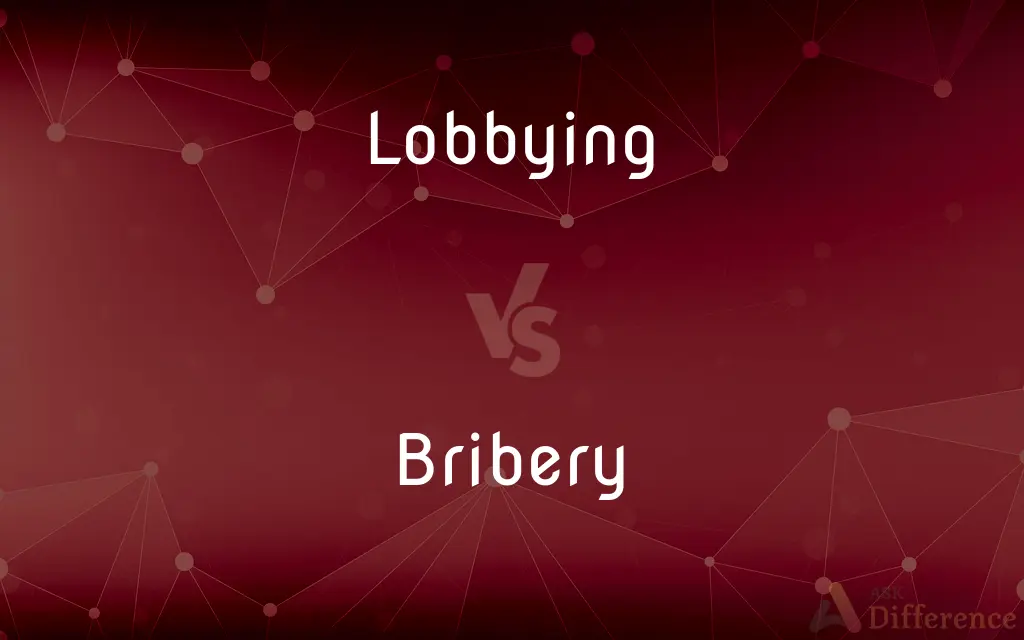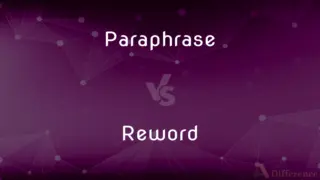Lobbying vs. Bribery — What's the Difference?
By Tayyaba Rehman & Fiza Rafique — Updated on September 16, 2023
Lobbying is the legal practice of attempting to influence decision-makers, usually through advocacy and persuasion. Bribery involves offering something of value, usually money, to manipulate a decision illegally.

Difference Between Lobbying and Bribery
Table of Contents
ADVERTISEMENT
Key Differences
Lobbying is a regulated practice designed to influence public decision-making processes, typically through advocacy, persuasion, or public relations efforts. It can include actions like meeting with lawmakers or conducting educational campaigns. Bribery, in contrast, is an illegal practice that involves the direct or indirect offering, giving, receiving, or soliciting of anything of value to influence an official act.
In lobbying, the exchange of ideas and information is legal and often considered essential for a functioning democracy. Lobbyists may use facts, data, and public interest arguments to convince politicians to support their cause. Bribery, on the other hand, is surreptitious and bypasses the public debate, aiming directly at getting favorable decisions through illegal means.
From a grammatical standpoint, both "Lobbying" and "Bribery" are nouns that can be used as gerunds (e.g., "He is lobbying for change," "She is engaging in bribery"). Both words can be modified by adjectives like "corrupt" or "influential," but the context drastically changes the implication of the terms.
Lobbying generally operates in transparent settings, subject to regulations, and with disclosure requirements. On the contrary, bribery is conducted in secrecy, as it is illegal and can result in criminal charges. Lobbying aims at influencing through persuasion, whereas bribery seeks to manipulate decisions through illegal financial incentives.
Comparison Chart
Legality
Legal and regulated
Illegal and punishable
ADVERTISEMENT
Methods
Advocacy, persuasion
Offering of value (usually money)
Grammatical Role
Noun, also used as a gerund
Noun, also used as a gerund
Transparency
Generally transparent, subject to disclosure
Conducted in secrecy
Ethical Stance
Generally accepted in a democratic setting
Considered unethical and corrupt
Compare with Definitions
Lobbying
Engaging with lawmakers for policy change.
They are lobbying to raise the minimum wage.
Bribery
Giving or receiving an illicit payment.
Bribery is a common form of corruption in some countries.
Lobbying
Utilizing resources to effect decisions.
The organization is lobbying for educational reform.
Bribery
Corruption through the offer of money or favors.
Bribery undermines trust in public institutions.
Lobbying
The act of advocating for a specific cause or action.
He is lobbying to protect the environment.
Bribery
The illegal practice of offering something of value to influence a decision.
He was arrested for bribery when he tried to pay off the judge.
Lobbying
Attempting to influence public officials.
She spent the day lobbying Senators about healthcare reform.
Bribery
An unlawful exchange to influence an official act.
The businessman engaged in bribery to win the contract.
Lobbying
In politics, lobbying, persuasion, or interest representation is the act of lawfully attempting to influence the actions, policies, or decisions of government officials, most often legislators or members of regulatory agencies. Lobbying, which usually involves direct, face-to-face contact, is done by many types of people, associations and organized groups, including individuals in the private sector, corporations, fellow legislators or government officials, or advocacy groups (interest groups).
Bribery
The act of manipulating decisions unlawfully.
The politician was expelled for bribery.
Lobbying
A hall, foyer, or waiting room at or near the entrance to a building, such as a hotel or theater.
Bribery
Bribery is defined by Black's Law Dictionary as the offering, giving, receiving, or soliciting of any item of value to influence the actions of an official, or other person, in charge of a public or legal duty. With regard to governmental operations, essentially, bribery is "Corrupt solicitation, acceptance, or transfer of value in exchange for official action." Gifts of money or other items of value which are otherwise available to everyone on an equivalent basis, and not for dishonest purposes, is not bribery.
Lobbying
A public room next to the assembly chamber of a legislative body.
Bribery
The giving or offering of a bribe
A bribery scandal
His opponent had been guilty of bribery and corruption
Lobbying
A group of persons engaged in trying to influence legislators or other public officials in favor of a specific cause
The banking lobby.
The labor lobby.
Bribery
The act or practice of offering, giving, or taking a bribe.
Lobbying
To try to influence the thinking of legislators or other public officials for or against a specific cause
Lobbying for stronger environmental safeguards.
Lobbied against the proliferation of nuclear arms.
Bribery
The making of illegal payment, or bribes, to persons in official positions as a means of influencing their decisions
Lobbying
To try to influence public officials on behalf of or against (proposed legislation, for example)
Lobbied the bill through Congress.
Lobbied the bill to a negative vote.
Bribery
(legal) the activity of giving, offering or accepting bribes
Lobbying
To try to influence (an official) to take a desired action.
Bribery
Robbery; extortion.
Lobbying
Present participle of lobby#Verb
Bribery
The act or practice of giving or taking bribes; the act of influencing the official or political action of another by corrupt inducements.
Lobbying
The act of one who lobbies.
Bribery
The practice of offering something (usually money) in order to gain an illicit advantage
Lobbying
A method of public persuasion.
Lobbying is often seen as essential for a functioning democracy.
Common Curiosities
Is Lobbying legal?
Lobbying is generally legal and regulated, often requiring disclosure.
How does Lobbying work?
Lobbying works by persuading decision-makers through facts, data, and logical arguments.
Can Lobbying turn into Bribery?
If a lobbyist offers money or something of value to influence a decision, it becomes bribery.
What is Bribery?
Bribery is the illegal practice of offering something of value to influence a decision.
Is Bribery secretive?
Bribery is secretive as it is illegal and involves illicit transactions.
Is Bribery ethical?
Bribery is generally considered unethical and corrupt.
What is Lobbying?
Lobbying is the legal act of attempting to influence decision-makers, typically through advocacy and persuasion.
Is Lobbying ethical?
The ethics of lobbying can vary, but it is generally accepted in democratic societies.
Is Bribery legal?
Bribery is illegal and can result in criminal charges.
How does Bribery work?
Bribery works by offering something of value, usually money, to manipulate a decision.
Is Lobbying transparent?
Lobbying is generally transparent and subject to disclosure laws.
Can Lobbying be harmful?
While generally legal, lobbying can be viewed as harmful if it disproportionately influences public policy in favor of special interests.
Are both Lobbying and Bribery Nouns?
Yes, both are nouns and can be used as gerunds.
Who can engage in Lobbying?
Almost anyone can engage in lobbying, including individuals, corporations, and advocacy groups.
Who can be targeted by Bribery?
Public officials, corporate executives, and other decision-makers can be targets of bribery.
Share Your Discovery

Previous Comparison
Haddock vs. Pickerel
Next Comparison
Paraphrase vs. RewordAuthor Spotlight
Written by
Tayyaba RehmanTayyaba Rehman is a distinguished writer, currently serving as a primary contributor to askdifference.com. As a researcher in semantics and etymology, Tayyaba's passion for the complexity of languages and their distinctions has found a perfect home on the platform. Tayyaba delves into the intricacies of language, distinguishing between commonly confused words and phrases, thereby providing clarity for readers worldwide.
Co-written by
Fiza RafiqueFiza Rafique is a skilled content writer at AskDifference.com, where she meticulously refines and enhances written pieces. Drawing from her vast editorial expertise, Fiza ensures clarity, accuracy, and precision in every article. Passionate about language, she continually seeks to elevate the quality of content for readers worldwide.















































